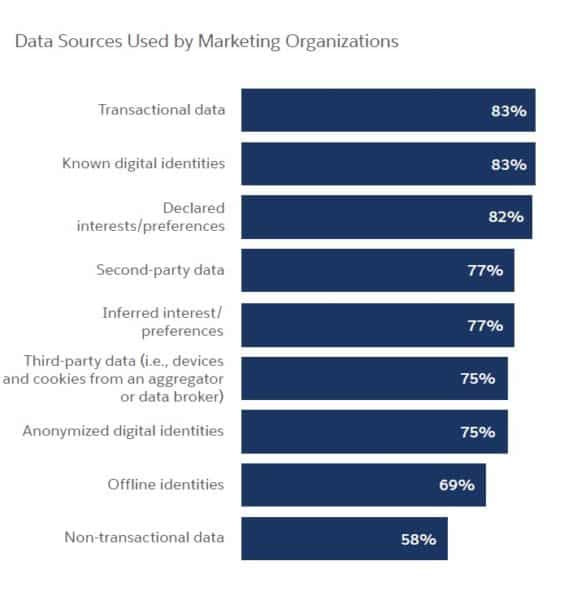Marketers are hoping more data sources will translate into better quality data. The average number of sources used by marketers grew by 50% from last year to this, according to a new Salesforce study. By the end of next year the total will be nearly twice what it was in 2021.
Last year companies used an average of 10 different sources. That increased to 15 this year and is projected to hit 18 by the end of 2023, according to Salesforce’s eighth annual “State of Marketing” report.
This comes at a time when multiple studies show marketers losing faith in their data.

It should be no surprise that the sources most used by marketers are also the most reliable. Transactional data and known digital identities are used by 83% of marketing organizations, with declared interests/preferences nearly tied with them at 82%.
Dig deeper: How companies are leveraging clean rooms and first-party data as cookies vanish
The least-used sources were non-transactional data (58%) and offline identities (69%), followed by third-party data and anonymized digital identities at 75% each.
Dealing with privacy changes. Despite Google pushing back the deadline for phasing out third-party cookies, new regulations mean marketers must adapt new ways to get consumer data now.
Providing customers with incentives to share information is the most popular method, being used by 56% of marketers. Other actions being taken to address privacy laws:
- Creating a first-party data strategy 54%
- Creating second-party data-sharing agreements 52%
- Investing in new technologies (e.g., a customer data platform) 51%
- Reducing internal data silos 49%
There may be some privacy protection fatigue setting in. The number of marketers saying they go beyond regulations and industry standards to protect customer privacy dropped from 61% last year to 51% in 2022.
The State of Marketing 2022 research is based on a survey of 6,000 marketing leaders across 35 countries, including marketing managers, directors, VPs and CMOs.
Why we care. The acronym GIGO isn’t used much these days, but the concept will always be true. Garbage in, garbage out is a fact when it comes to data and analytics. Bad information makes for bad strategies. Hopefully, more data sources means more ways to cross check it.
Get MarTech! Daily. Free. In your inbox.
























































![Key Metrics for Social Media Marketing [Infographic] Key Metrics for Social Media Marketing [Infographic]](https://www.socialmediatoday.com/imgproxy/nP1lliSbrTbUmhFV6RdAz9qJZFvsstq3IG6orLUMMls/g:ce/rs:fit:770:435/bG9jYWw6Ly8vZGl2ZWltYWdlL3NvY2lhbF9tZWRpYV9yb2lfaW5vZ3JhcGhpYzIucG5n.webp)






















